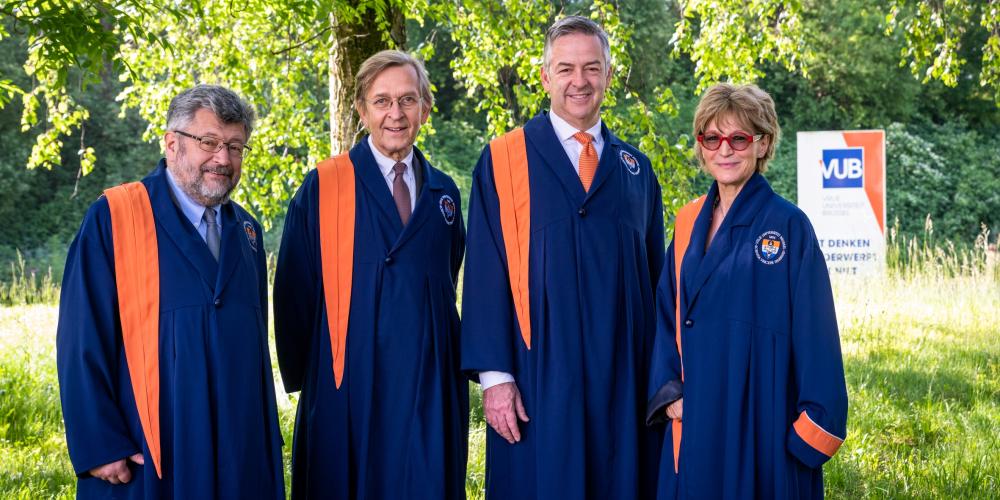
The VUB awarded five honorary doctorates on Thursday 1st June. Secretary-General of Amnesty International Agnès Callamard, co-founder of Scholars at Risk Robert Quinn, economist Mariana Mazzucato, top international law scholar Martti Koskenniemi and mathematician Efim Zelmanov each contributing to free and open science in their respective fields and thus continuing to build a better world for all: reason why they were awarded an honorary doctorate from the Vrije Universiteit Brussel. The proximi explained in their laudatios.
Professor of applied physiology Andrew Jones was already awarded with his honorary doctorate at a ceremony on 20 April. During the presentation ceremony, Mariana Mazzucato was in London and the audience got to see a video message from her.
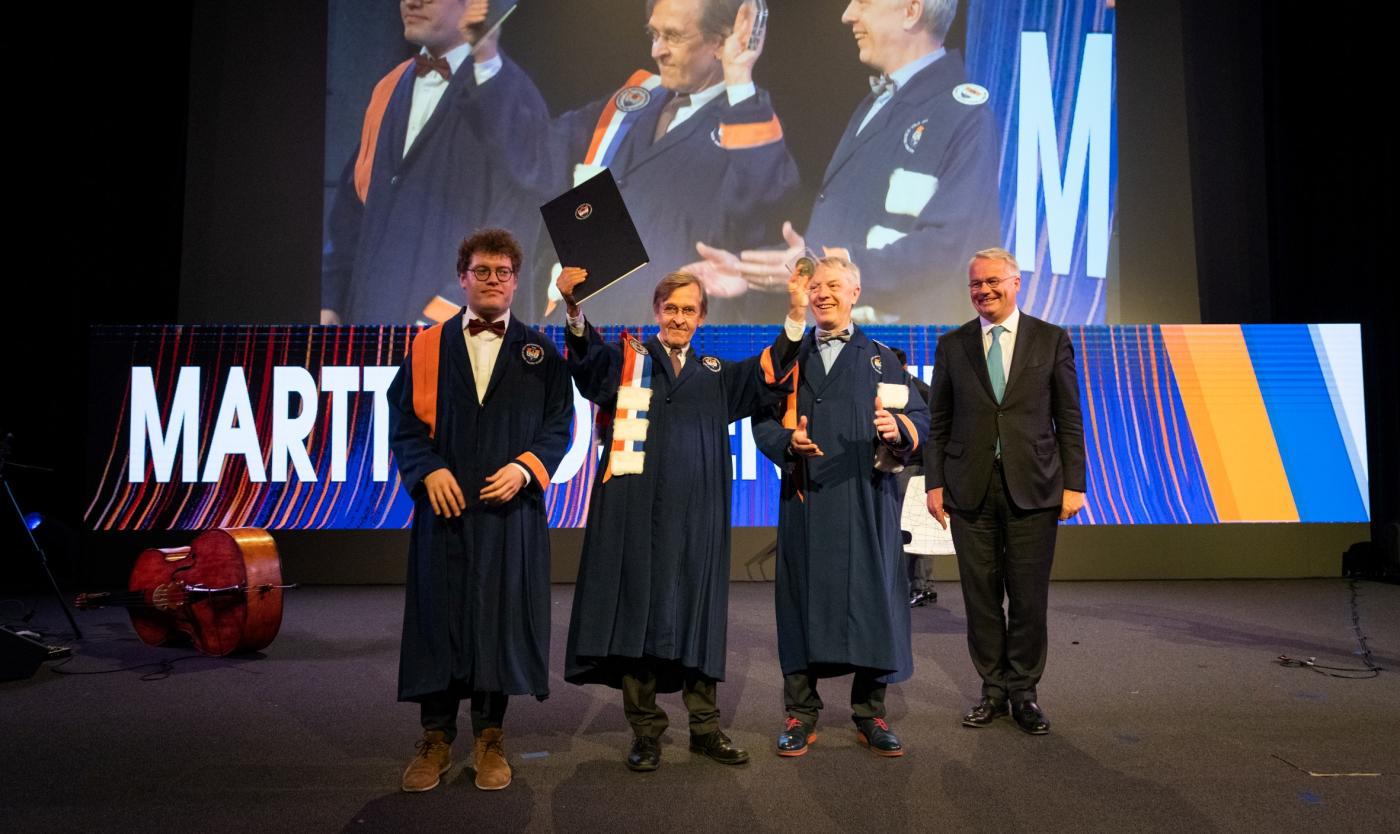
Martti Koskenniem with proximus Frederik Dhondt, and rector Jan Danckaert and president Karsten De Clerck.
Proximus Frederik Dhondt addressed the following laudation to international lawyer Martti Koskenniemi
"This university believes in the power of science. We think that scientific knowledge is there to enlighten the public debate. Martti Koskenniemi, however, warns one category of scientists. International lawyers. They are no bearers of objective knowledge. They are consulted as experts. As such, they must be aware of their societal impact, and of the ideology of legal discourse, or, to use the title of one of his works, The Politics of International Law. Professor Koskenniemi combines immense erudition with a eternally youthful and sparkling mind.
It is rare that scholars of positive law engage in historical debates. In this case, his work is incontournable. It partly symbolises the turn to history in international law. Especially for Belgium, his study The Gentle Civilizer of Nations starts in the Ghent Town Hall, where the Institute of International Law (Institut de Droit International) was founded in 1873. The ambitions of its founders become clear in their contempt for classical diplomatic or positivist authors of the Droit public de l’Europe. However, the ambiguity of their idea of “Civilisation” in the era of colonialism is clearly highlighted."
"If we follow his most recent book To The Uttermost Parts of the Earth our honorary doctor did not even envisage to write a history of international law. If we are respectful of the past, we must accept that our categories of analysis are mobile. International law can be found in economics, philosophy, political science, statecraft, colonial exploitation and resistance to it, from Cardinal Richelieu to Adam Smith back to medieval roman law. Lawyers’ big distinction between private and public law is only a construct. The real question is: How does one justify sovereignty or property ?
Martti Koskenniemi’s work is critical, but not nihilistic. It doesn’t only guide positive lawyers, but has also become an alternative pathway to access the classical canon of legal science. The study of the past will always endure, as it is congenital to humankind. However, it takes exceptional brilliance to be the guide of a generation of researchers, and reduce the mountain of paper to a mere 900 pages.
We are very grateful with the whole academic community of VUB that prof. Koskenniemi has accepted this honorary degree."
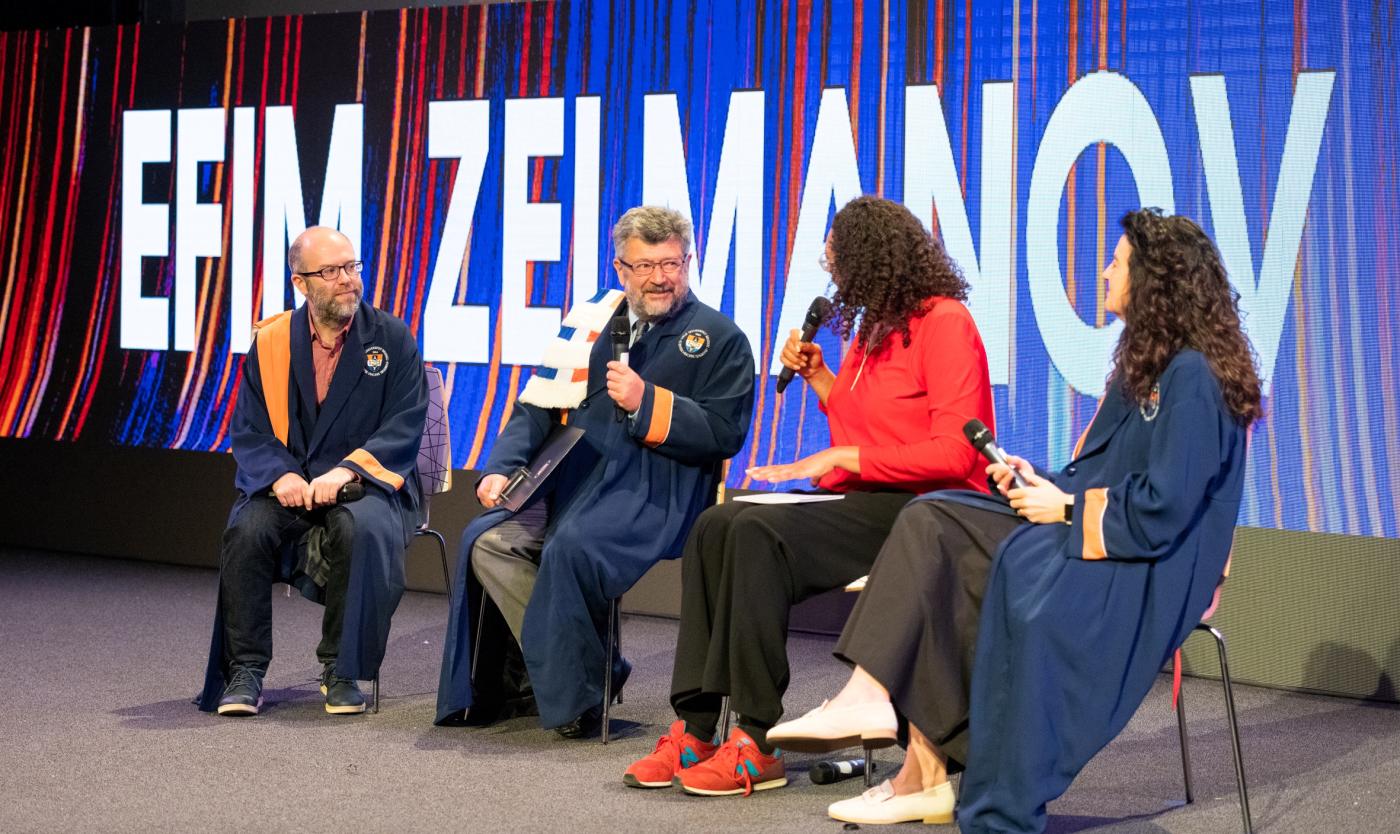
Efim Zelmanov is interviewed with proximi Leandro Vendramin and Ann Dooms.
Proximi Ann Dooms and Leandro Vendramin addressed the laudatio to Efim Zelmanov
Leandro: "Efim Zelmanov received his Ph.D. in mathematics in 1980."
Ann: "Mathematics is the language of the universe, Galileo Galilei said. It helps us to understand not only the physical but also the digital world around us."
Leandro: "Zelmanovs thesis was in algebra, an important branch of mathematics that allows us to make abstractions. His work completely changed the whole subject, extending results to the infinite-dimensional setting. Already as a young researcher he was invited to the International Congress of Mathematicians to discuss his outstanding work."
Ann: "In 1987 Zelmanov solved one of the big open questions in the theory of Lie Algebras. Again, he cracked a big open problem by studying what happens in the infinite-dimensional case. "
"These results already guaranteed Zelmanov a place in the list of the great algebraists of the 20th century. But in 1991, Zelmanov solved one of the most fundamental results in group theory (i.e., the mathematical theory of symmetries). He cracked a 100-year-old problem known as the (restricted) Burnside problem. His solution combines a unique technical capability with highly original ideas from various disciplines. "
Leandro: "Zelmanov is not only an exceptional researcher. He is also an outstanding teacher and a role model for our students. His lectures are always inspiring and beautifully constructed, indeed models of clarity, showing what has been achieved and presenting several possible directions for future research."
Ann: "In addition to the Fields Medal, Zelmanov has received many other honors for his outstanding work. He is one of the world's top mathematicians and will play a crucial role in strenghtening our mathematics department's international reputation and tradition of excellence."
"We are thrilled that the list now includes an Honorary Doctorate from the VUB. Thank you so much, professor Zelmanov. "
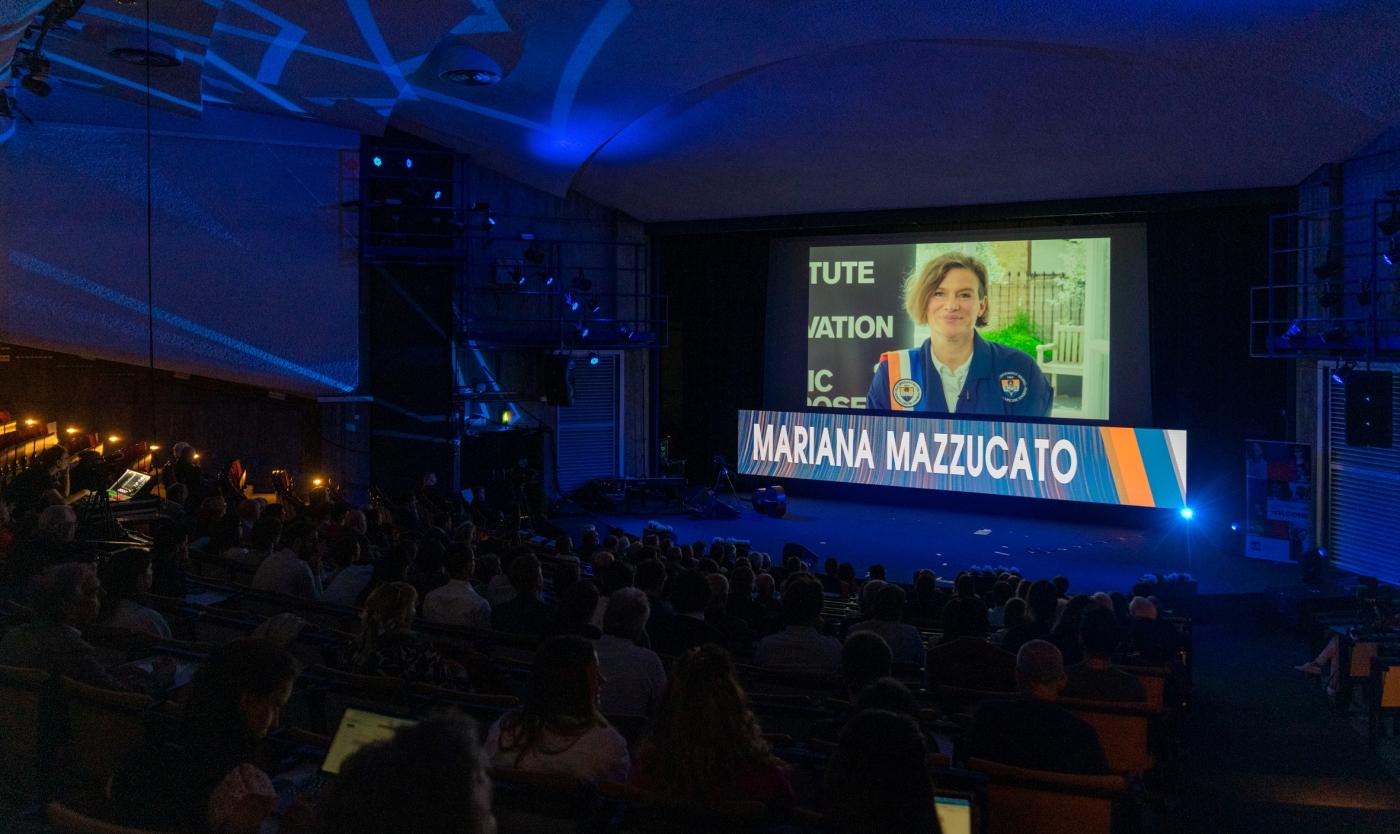
Proximus Cathy Macharis addressed Marianna Mazzucato in London
"It is my great honor to speak to you today about Marianna Mazzucato, an economist and professor at University College London. She is a true visionary in her field, and her work has had a profound impact on how we think about the role of the state in fostering innovation and tackling the climate crisis.
Professor Mazzucato is perhaps best known for her groundbreaking book, The Entrepreneurial State, which challenges the traditional view of the state as a passive, bureaucratic entity that simply regulates and redistributes wealth. Instead, she argues that the state has always played a crucial role and should stop repairing, but should be the one who is preparing for the future."
"Her next bestseller Mission Economy, goes further in this direction and shows how a moonshot goal could reunite in a symbiotic way organisations from the public and private sector in order to attain a challenging goal, like solving the climate crisis. We need to be again ambitious, like when preparing to go to the moon.
What truly sets Professor Mazzucato apart is her unwavering commitment to social justice and sustainability. She has been a vocal advocate for using public investment to tackle pressing global challenges such as climate change and inequality, and her work has inspired countless governements and others. She also rightly says we need new tools to integrate stakeholders into the decision making and evaluation processes. She calls it stakeholder capitalism.
In short, Marianna Mazzucato is a true visionary whose work has fundamentally changed the way we think about the role of the state in promoting innovation and social progress. Her contributions to economics and public policy have been nothing short of remarkable, and I have no doubt that she will continue to inspire and challenge us for years to come.
Marianna Mazzucato, thank you for accepting the title of honoris causa of the VUB."
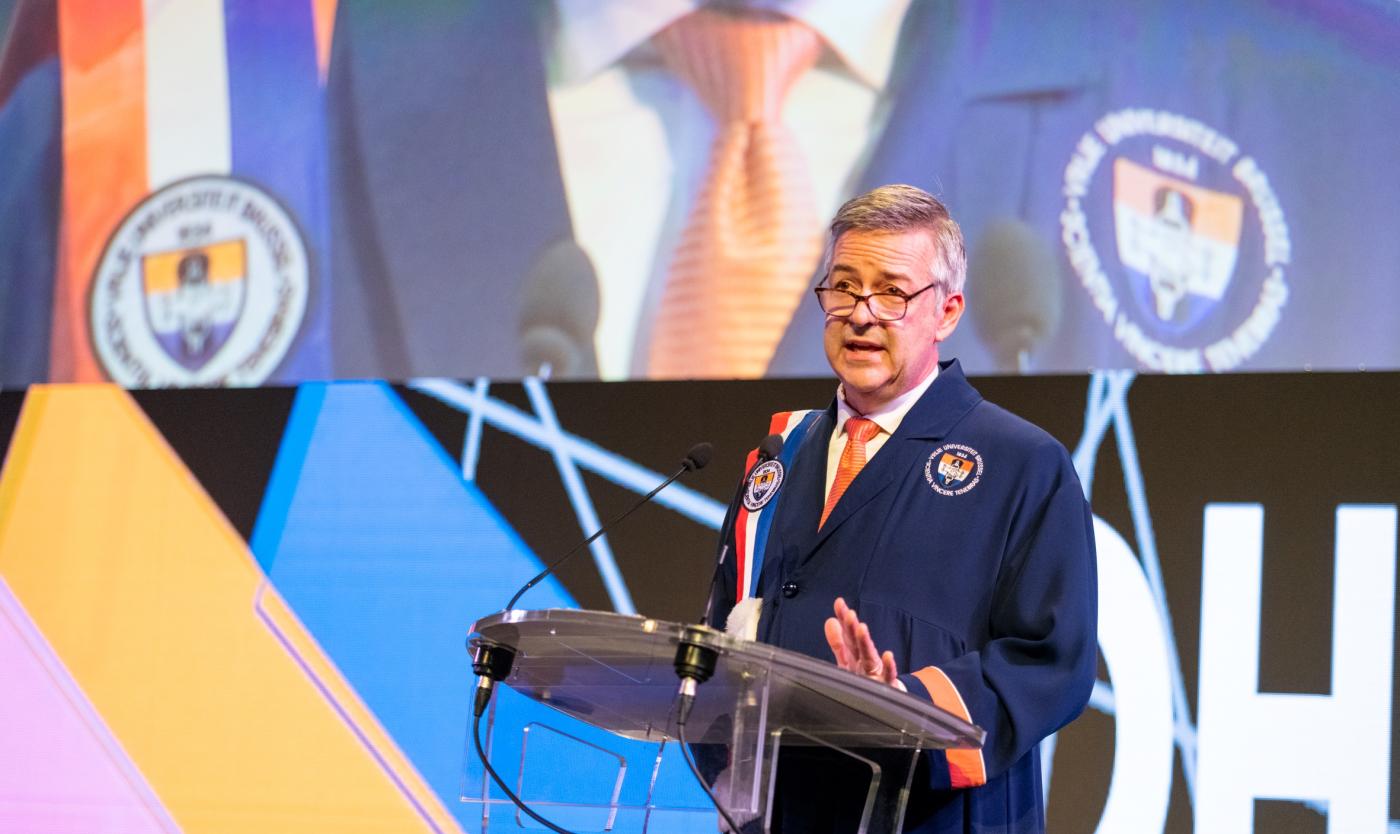
Proximus Karin Vanderkerken honoured Robert Quinn
"It is my honour to present to you, Mr. Robert Quinn. He is co-founder and executive director of the Scholars at Risk network, an independent not-for-profit organisation based at New York University. He is also host to the Free To Think podcast.
Robert founded the Scholars at Risk Network in 2000 in the US to protect at-risk scientists across the world, and to provide them with a safe haven, and to protect the right to freedom of thought, freedom of expression – values that are at the core of our university.
They manage to identify scientists in need of protection thanks to a very close-knit collaboration with human rights organisations. After a thorough screening, the organisation goes in search of a host institution. For this, the Scholars at Risk Network can rely on 600 universities across the world."
"VUB is an active member of the Scholars at Risk Network and has so far housed three scholars with a fourth one currently present at VUB. It is a way for our VUB faculties and departments to gain insight in different ways of working, and come into close contact with different cultures. Robert’s work with Scholars at Risk fully supports the VUB’s values of inclusion, diversity, freedom of speech, academic freedom, free enquiry, social engagement, and human rights.
A graduate of Princeton University in 1988, and from Fordham in 1994, he and the Scholars at Risk Network received the University of Oslo’s human rights award, as well as the Lisl and Leo Eitinger Prize for “relentless work to protect the human rights of academics and for having inspired and engaged others to stress the importance of academic freedom.”
It is a pleasure and an honour for me and our university that you, Robert Quinn, have agreed to accept the title of Doctor Honoris Causa at the VUB – congratulations."
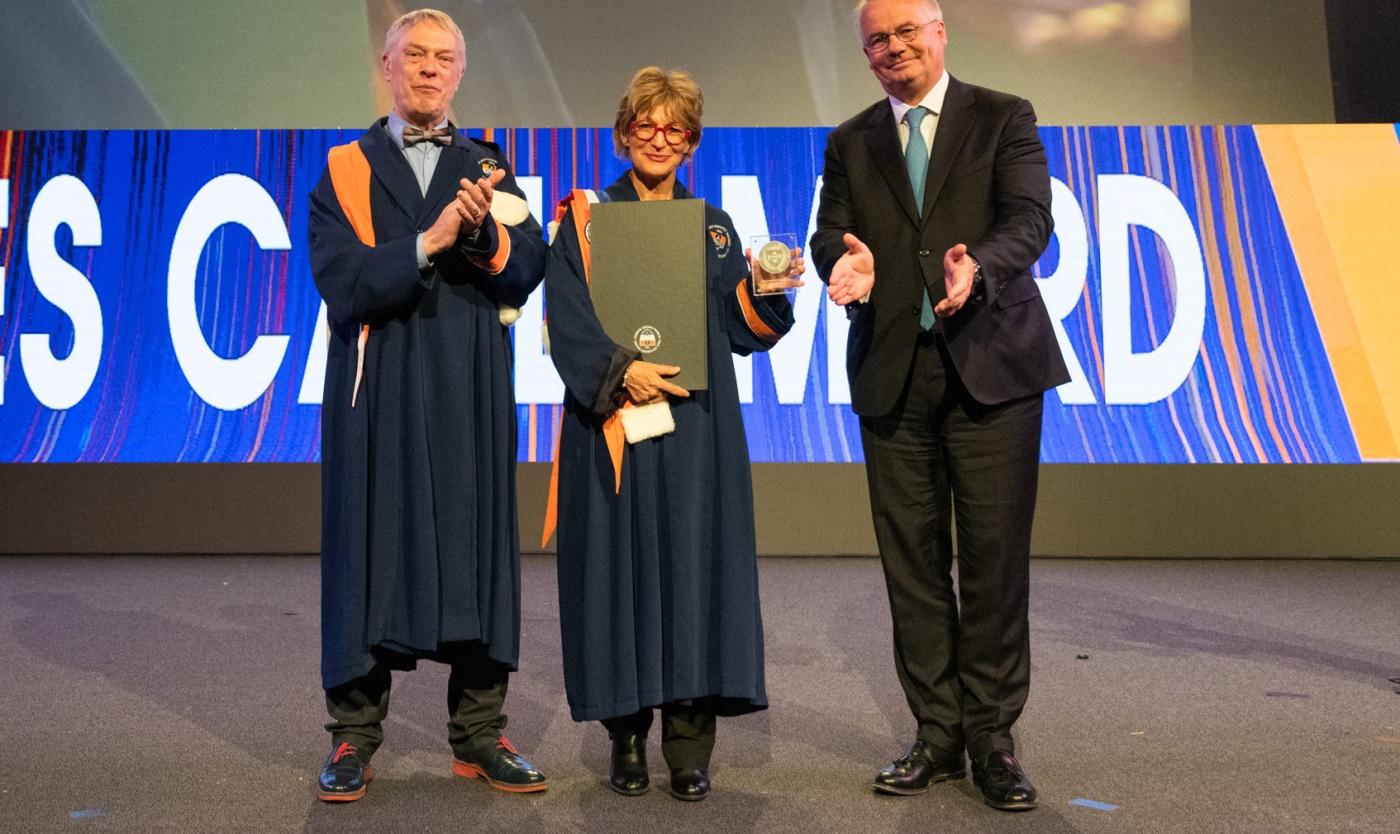
Agnès Callamard receives the medal from Jan Danckaert and Karsten De Clerck.
Proximus Jan Danckaert Lauwerde Agnès Callamard
"Agnès Callamard is a French human rights activist. Her career so far has been impressive. Agnès Callamard has worked with numerous aid and human rights organisations. From 2016 to 2021, she was the special rapporteur appointed by the UN’s Human Rights Council, with a mandate to investigate extrajudicial, summary and arbitrary executions. Or in other words: state terrorism. Mrs Callamard led the investigation into the murder of Saudi journalist Jamal Khashoggi. After presenting her findings in 2019, she received death threats. Being a human rights activist requires courage, the courage of one's convictions."
"In 2021, Agnes Callamard became secretary-general of Amnesty International. The mission of Amnesty is to campaign for a world in which every person enjoys all of the human rights. In 1977, Amnesty International was awarded the Nobel Peace Prize.”
"The organisation was founded in 1961. Its founder, Peter Benenson, stated: “Only when the last prisoner of conscience has been freed, when the last torture chamber has been closed, when the United Nations Universal Declaration of Human Rights is a reality for the world’s people, will our work be done.”
Today, after more than 60 years of groundbreaking achievements, the work is still not done. For Amnesty, and it's 10 million members. And I am thinking here of our dear colleague Ahmadreza Djalali. Dr Djalali is a visiting professor and expert in disaster medicine at our Faculty of Medicine. He has been in an Iranian prison cell for seven years now. Without any evidence, he has been sentenced to death. Any day now he could be executed. And for seven years, we campaigned with Amnesty International, in front of the Iranian ambassy in Brussels, and by every other means possible to get our colleague released. And thanks to Amnesty International, we are not losing hope.
Secretary-general Agnès Callamard, it is a great honour for us that you have accepted to become doctor honoris causa of VUB. "